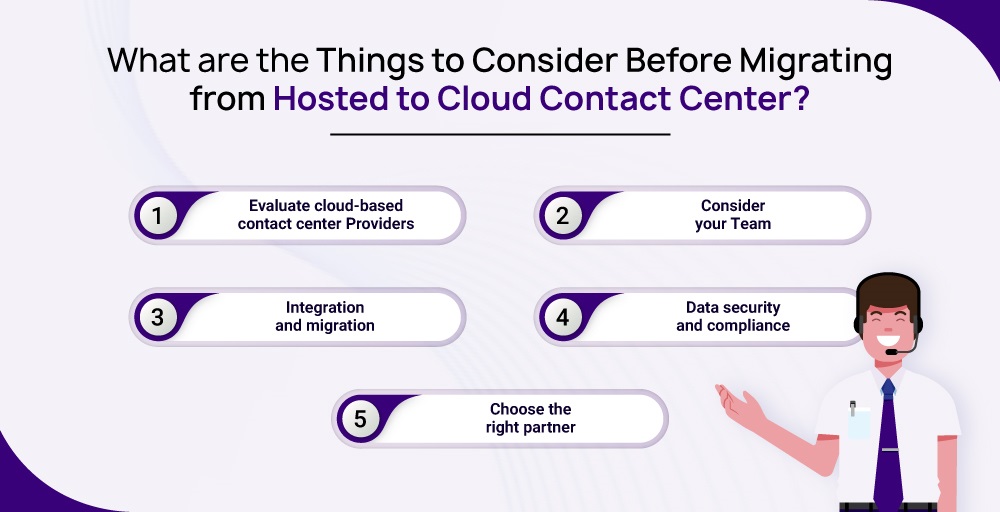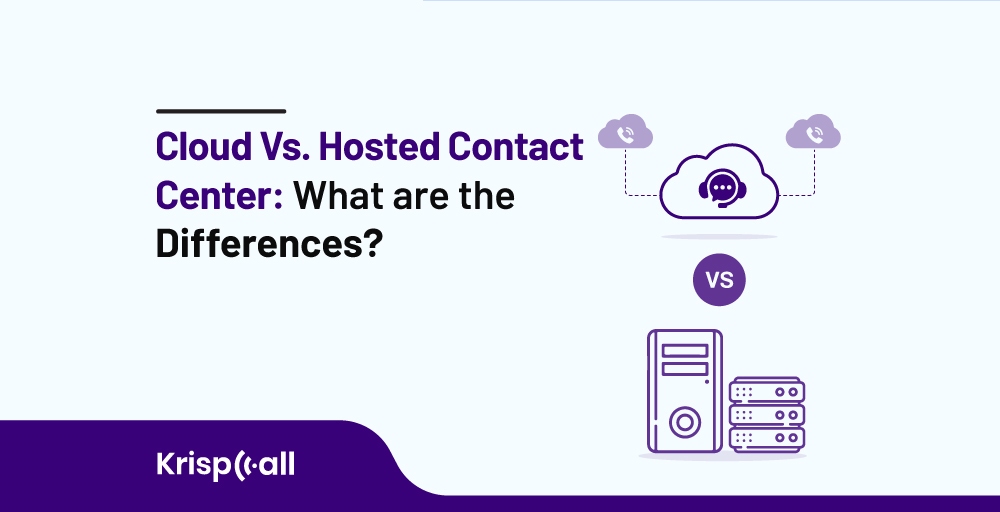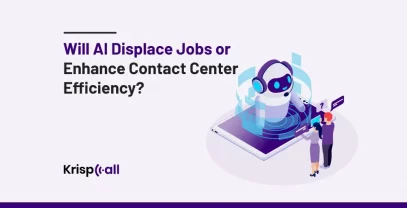Do you often get confused between cloud and hosted contact center solutions? 😵💫
Every business size needs to choose a contact center type and provider wisely. With the right contact center setup, businesses can provide excellent customer service while eliminating excess technology costs.
But, it can be challenging to figure out which option is right for your business.
Don’t worry 😉! We are about to explore cloud and hosted contact center solutions in this blog.
We’ll explain the key differences between these two approaches, helping you make an informed choice that aligns with your organization’s needs.
Read until the end to learn about both cloud and hosted contact center solutions to make an informed decision.
🔑 KEY HIGHLIGHTS
- Hosted contact centers require a physical server, while cloud contact centers host all resources off-site using cloud technology.
- Hosted and cloud contact centers use contact center software, which allows customers to contact a business through telephone, email, web chat, and social media.
- Cloud contact centers provide access to virtual servers and scalable resources without requiring direct network connections.
- A hosted cloud contact center is hosted at the service provider’s physical location instead of on the business premises.
What is a Cloud Contact Center?
A Cloud Contact Center is a customer service solution that operates in the cloud, meaning it is hosted in the cloud and handles all inbound and outbound communications from virtually anywhere. Using it, large organizations with contact centers can manage calls, messages, and agents and use sophisticated call routing, call management, and analytics tools. A contact center software platform captures all these contact channels at your end.

Additionally, no dedicated servers are used. When needed, your company will have access to all server space, allowing you to scale up during high-demand periods without incurring excess costs. Since there are no physical server locations, you enjoy higher business continuity than with on-premises or hosted contact centers.
🤝 Talking about the benefits of Cloud Contact Center in business, they are:
- Reduce work for the IT department: Cloud providers build and maintain all the hardware, so your IT department does not have to worry about servers or software updates. Security and troubleshooting are also the provider’s responsibilities.
- Cost reduction: Cloud services allow you to pay only for what you use. Additionally, your team does not have to invest in hardware or licenses they may never use. Also, the calling and SMS rates are cheaper than those of the traditional cloud contact center.
- Integrate business systems and data: Cloud contact center solutions can integrate seamlessly with other existing business tools and CRM software. This integration streamlines workflows and boosts team collaboration and productivity. For example, if your cloud communications platform is integrated with a CRM, your employees will be able to see customer information before receiving incoming calls, sync contacts, and improve customer service.
- Promote remote working: As cloud services are hosted on the cloud, they can be accessed from any device and location. An internet connection and a login are all they need.
- Increase agility and scale quickly: With cloud services, you can modify workflows, add new features and functionality, or add and remove users in a matter of minutes.
What is a Hosted Contact Center?
A hosted contact center is one that is hosted by your service provider rather than on your premises and is accessed via the Internet. Businesses can use it to manage their customer interactions over the cloud at a low cost.
With a hosted contact center, your service provider becomes your IT infrastructure, so your agents only need laptops, headsets, and an internet connection.

Hosted contact center models can still involve significant IT costs and responsibilities, such as updating, patching, and modifying contact center software.
Looking into benefits, a hosted Contact Center may not have benefits as good as a cloud contact center, but here are some advantages it offers more than a traditional on-premises contact center:
- Reduced Costs: Hosted call centers reduce costs in different ways. Subscriptions are monthly or yearly, and there are no equipment costs (except for devices and headsets for agents). Remote agents can work from smaller premises or without real estate altogether. Calls are also often cheaper than landlines.
- Scalability: Hosted contact centers can handle a high volume of calls and keep customers happy. You can also add more agents without installing new phone lines as you grow. When your business is seasonal, or you know there will be a busy period, you can add extra users easily.
- Extra Features and Integrations: Hosted call centers, especially those in the cloud, offer many capabilities that aren’t available with on-premises systems. Customers can communicate via video, instant messaging, SMS, email, and chatbots. Additionally, your phone system can integrate with CRM and workforce management software.
Cloud Vs. Hosted Contact Center: What are the major differences?
Cloud-based contact centers take advantage of the capabilities of cloud computing, unlike hosted contact centers. As a result of hosted services, IT has more control, but it also has more work to do. In comparison, cloud services are easier to set up, manage, and maintain.
Here are the major differences between cloud and hosted contact centers:
| Factors | Cloud Contact Center | Hosted Contact Center |
| Infrastructure: | Hardware and software are hosted off-site by the provider. | Infrastructure requires a physical server and third-party hosting. |
| Features: | Easy integration, low maintenance costs, rapid disaster recovery, and flexible and scalable operations. | Not as many features as Cloud contact center |
| Cost and Maintenance: | Minimal maintenance and no upfront investments. | It may be disrupted by maintenance and upkeep. |
| Security: | It provides rapid disaster recovery, business continuity resilience, and remote access. | High security, but few disaster recovery and business continuity options. |
| Integration: | Offers easy integration with pre-built integrations and APIs, allowing for seamless connectivity. | It may have limitations in terms of seamless integration. |
| Reliability: | Agents must have a strong internet connection to achieve 100% uptime in cloud-based systems. | Having multiple data centers for redundancy is key to reliability. |
| Uptime: | Better uptime and availability Compared to hosted solutions. | Frequent downtime than a cloud-based contact center. |
| Deployment Time: | Takes only a few hours to deploy. | Longer setup and installation time. |
| Control: | Less control over physical servers and more over software. | Software and features are less under your control. |
Cloud Vs. Hosted Contact Center: Infrastructure
A cloud contact center is hosted and managed by a third party on remote servers, so it can be accessed anywhere with an internet connection. As it can be scaled up or down quickly, it offers flexibility and scalability.
Hosted contact centers require a physical server, typically provided by a third party, and require the organization to manage and maintain it. As a result, it is limited in flexibility and scalability compared to a cloud contact center
Cloud Vs. Hosted Contact Center: Features
A cloud contact center offers omnichannel support, workforce management, advanced routing
algorithms, reporting, and analytics. With their flexibility and scalability, businesses can implement remote work teams.
A hosted contact center may offer similar functionality but not be as up-to-date in terms of features and integrations, as the provider may not manage upgrades and maintenance. The features are limited to IVR, Call Monitoring, and Immediate Call Routing.
Cloud Vs. Hosted Contact Center: Cost and Maintenance
Hosted contact centers eliminate onsite server hosting but are still tied to physical servers, increasing maintenance costs. You have to pay for the host/server, and if you have any technical problems with your hardware system, you have to pay for maintenance.
In contrast, cloud contact centers are more cost-effective and scalable. If you have a problem in your contact center software, customer support will fix the issue without having to pay the extra bill. Moreover, they reduce maintenance costs by eliminating the need to manage and maintain infrastructure.
Cloud Vs. Hosted Contact Center: Security
Hosted contact centers require physical servers and third-party service providers host the infrastructure. They need the organization to manage and maintain the physical servers, and they provide maximum control over the implementation of the software.
On the other hand, in a cloud contact center, all resources are hosted off-site by a third-party service provider on cloud-based technology. Cloud contact centers offer more flexibility, scalability, and rapid deployment. They also eliminate the need for significant upfront investments and provide seamless integration. Cloud contact centers are more cost-effective, accessible, and resilient, with less downtime and malfunction than hosted contact centers
Cloud Vs. Hosted Contact Center: Integration
You can integrate cloud contact centers with social media, email, and customer relationship management (CRM) software, allowing businesses to offer seamless customer service.
While hosted contact centers may offer integrations such as they may not always be responsible for updating their features and integrations.
What are the things to consider before migrating from hosted to cloud contact center?

When upgrading from a hosted to a cloud contact center, you need to keep a few things in mind. Among them are:
- Evaluate cloud-based contact center Providers: Look for scalability, experience, and support when evaluating providers. Find a provider that provides the features and integrations you need, as well as a pricing model that fits your budget.
- Consider your Team: A successful migration depends on the preparedness of your team. Provide comprehensive training for your employees on the new platform. Make sure key departments like security, operations, and finance are involved in the transition.
- Integration and migration: You should plan how your existing communication channels will integrate with the cloud solution, especially the phone system. You should consider the potential impact on customer experience and ensure a seamless transition.
- Data security and compliance: Understand the data security and compliance implications of migrating to the cloud. Choose a cloud contact center solution that meets all regulatory requirements and provides robust data protection measures to safeguard sensitive customer information.
- Choose the right partner: You should select a migration partner that not only offers the technical capabilities you need but also provides the support and guidance required for a smooth transition. Consider factors such as their experience, reputation, and ability to cater to your specific business needs.
KrispCall: A Cloud Contact Center
If you’re looking for a cloud contact center, KrispCall is the best choice. Through KrispCall’s contact center software, businesses can manage customer relationships and provide personalized service. A popular contact center software solution, KrispCall is well known for its advanced features and commitment to customer satisfaction.
KrispCall’s contact center software also supports text and voicemail communication channels in addition to phone and live chat. For the best customer support, it connects agents and customers across multiple channels. You can access a wide range of features with our contact center software.
Sign Up for KrispCall to experience the benefits of cloud contact center software and improved customer relationships. With more than 4500 customers in over 100 countries, it is a reliable service provider.
Making a choice: Which one is better?
A cloud contact center and a hosted contact center may sound the same, but they differ in several ways. They both have the advantage of not requiring heavy on-premises infrastructure.
Businesses that need a controlled environment for compliance or security purposes should consider hosted contact centers. For organizations with existing investments on-premises, they can be seamless.
However, cloud contact centers are more scalable than hosted ones. As the world shifts to the cloud, cloud contact centers are the best way to manage your business communication and customer service. You don’t have to manage all the different data as the storage is in the cloud, so your team can access it even if they work remotely.
So, If you’re planning to try a cloud contact center solution for your business, Book a Demo or Contact Us.
FAQ
How do you migrate to a hosted contact center?
To migrate to a hosted contact center, you can follow the given process.
- Plan your migration: You must address data security and access in advance to streamline your cloud migration process.
- Make the right choice: Find a migration partner that meets both your current and future needs for your contact center operations. Your transition will be easier if you hire a company that manages all processes and provides you with the features you need.
- Test before the transition: Find out how your business can optimize its resources, scale, and automate its workflows before committing to cloud migration.
- Take a proactive approach: Prioritize customer experience throughout the cloud integration process. As a result, disruptions will be minimized.
What is hosted contact center software?
A hosted contact center solution is a customer experience solution hosted by a third party. A remote server hosts the contact center software, and the provider owns the hardware. Cloud-based contact centers are “multitenant,” whereas hosted or on-premise contact centers are “single-tenant.” Although hosted contact centers offer reduced maintenance and upgrade costs, top-notch security, and software, they are not as cost-effective or scalable as cloud contact centers.





